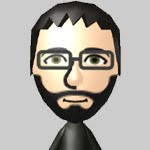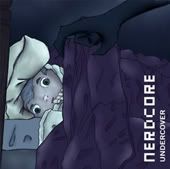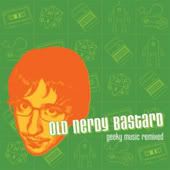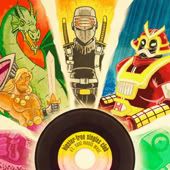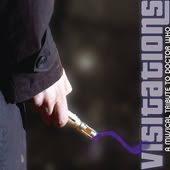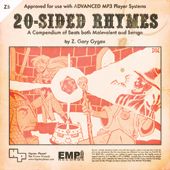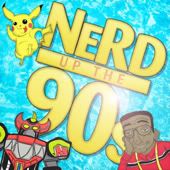That being said, I am about to mount the podium. You're all welcome to gather up front on the amen pew, to slink slyly to the rear of the sanctuary or to simply walk back out the double doors before I unleash my fire and brimstone. And I certainly won't think less of you for choosing the latter.
I have spent my three decades plus upon this Earth as an outsider, a nonconformist, a nerd. At times, I attempted to curb this inclination and find acceptance by those who would reject me. Likewise, at times I ramped up this inherent differentness as nothing more than a symbolic middle finger to the same. Now in my thirties, I have settled into a natural equilibrium, or, to steal from nerdcore rapper Doctor Awkward, geekquilibrium. I have at long last rectified my most studious tendencies with my more acceptable passions. In short, I am – this time misquoting the 2 Live Crew – as nerdy as I wanna be. No more. No less.
Part of this process, this becoming, is due to a maturing on my part, albeit an admittedly small one. At this stage in my life I am self-aware enough to realize who I am, and I have made my peace with that.
Another aspect, which I also attribute to age, is the fact that I am now too goddamn tired to care what other people think of me. Now this certainly doesn't mean I don't want others to like me, to respect and accept me. (This is ingrained well within human nature itself, and even we proud nerdlingers fall under its sway.) It just means that I am no longer an adolescent bundle of neuroses, your textbook diminutive, underweight, self conscious geekboy. I proudly announce that I have, in fact, grown into a diminutive, underweight, fulfilled adult who simply doesn't have the time or the inclination to wonder if that lady standing behind me in line at the DMV is actually laughing at me.
(And what if she is? Why the hell should I care? That bitch couldn't even complete the written test!)
But be it due to the mellowness of adulthood or my own emotional sloth, the important point here is that I am okay with the person that I am. More than anything, projects like Hipster, please! and Radio Free Hipster are about both a celebration of that and a conduit through which the rest of us war-worn survivors can toast our victories. It's my hope that the positivity we spread and the brotherhood we foster can then somehow radiate to the next generation. Our modern analog, the latter day misfit who is still, as my pal Matt puts it, "get[ting] shoved into a locker."
Thankfully, this is a shared mission; it's something that everyone from fellow bloggers to entertainers like YTCracker has spoken about at one time or another. Simply put, we're trying to lessen the type of bullshit with which we had to cope for poindexters yet-to-come by hammering our shared experiences and passions into a cultural shield. We're telling others and reminded ourselves that being different does not immediately equate with being alone.
With this established, I have recently picked up on a trend that threatens our task at hand. And like the most diabolical of nemeses –Carpenter's Thing, Procter & Gamble's Cavity Creeps, et al – this threat comes from within.
Throughout this missive I have used the terms "nerd" and "geek" (and a handful of other more esoteric words) interchangeably to describe myself, but each day it seems that more and more of our kind are drawing dividing lines between such terminologies. Many are compartmentalizing, not for the simple geeky joy of categorizing, but with a distinctly divisive intent. Geeks, we are told, are cool techies with eccentric passions, while nerds are awkward basement dwellers defined by their social failings.
This argument most recently came to a head within our broader community when dork luminary Wil Wheaton posted a video by the Society for Geek Advancement, a vid, I might add, that he took part in.
In the earliest moments of this piece, G4 talking head and fauxhawk aficionado Kevin Pereira declares that he is neither a nerd nor a spaz. From that point, contributors from Leo Laporte to MC Hammer proceed to "celebrate" geek culture. By scornfully deconstructing it. The underlying theme seems to be that geeks are a tech-savvy breed of snarky supermen. A group so socially enlightened as to place them head-and-shoulders above your common basement dwellers, your spotty comic shop frequenters or even your average man on the street.
And I call bullshit.
What we see hear is a clear example of – to turn our eyes back to my buddy Matt's concise description – cultural appropriation. In this sense "geek" is no longer a relevant label of self-identification, but a brand. Geek is Twitter. Geek is Tumblr. Geek is exclusivity. Geek is pomposity.
Except it's not.
In a follow-up to his original post, Wil, who was incredibly excited about the project at its inception, describes it as something that "was supposed to be about refuting stereotypes and celebrating the things we love, but it ends up feeling like we're trying to convince the Cool Kids that we're really just like them."
There's steel in those words, my friends.
A great number of us have begun espousing the belief that what we do, that what we are, is a culture rightfully unto itself, and we've done so by embracing the names that were used as weapons against us. We took back geek and nerd and dweeb, and we bent them to our own needs. We wore them like badges of honor. But at some point we experienced a schism. We began to add our own precise context to these nonsensical words with no legitimate definition or etymology, and use them to cloister what some saw as our own less desirable elements.
We split up the nerds – a Seussian word used adjacent to "Nerkle" and "Seersucker" – and the geeks – a carnie term for a performer who eats live animals – based on unqualifiable differences instead of uniting them under their obvious similarities. We, in short, became our own tormentors. We decided who would sit at our table and who would be relegated to the far side of the lunch room. We became that guy who shook you down and called you fucking faggot or that girl who defaced your gym locker and made you a laughingstock. We became our own worst enemy. And we did it gladly.
Tor.com's Bridget McGovern, in a recent piece on the I AM A GEEK! debacle, pinpointed what I found so distasteful about that particular example saying:
To be so dismissive of traditionally maligned geek interests and so incredibly smug about our apparent technological superiority at the same time doesn’t celebrate geek culture—it’s just a cheap way of buying up some nice property in the mainstream, at the expense of the quirks, the playfulness, and the ability to be comfortable being different that is the essence of geekdom.This enduring "geek chic" that the mainstream media has become so fixated upon is key to spreading our message of hope, but it can also prove a destructive element if we lose site of the fact that we are all but defined by some of our most unsavory experiences and inclinations. Whether geek or nerd, we each spent a lengthy season being abused, neglected, isolated. We know what it's like to be bullied and to be made to feel insignificant. We know what it's like to be outsiders. But while this pain is certainly not ours alone, it is also a defining force that we must not lose sight of.
The fact that we came through the fire and yet retained those things that made us targets -- that is our strength. That awkwardness, that social pariah status, may be something that we, as adults, have more or less tamed, but that doesn't mean it was never there. Saying that within out own community person A is B because of strength/weakness C and that person X is Y because of strength/weakness Z not only devalues our shared heritage, it sends an actively destructive message to our younger counterparts. It tells them that not only are they refused entrance into hallowed halls of high school popularity, but that we won't even let them in our own Honeycomb Hideout.
Many of my friends and colleagues prefer to identify as geeks rather than nerds, and that is fine. Our culture is all about personal choice, and if prefer to be called a frog as opposed to a cheese eating surrender monkey due to my Franco-American heritage, there's surely no harm in me picking my own poison. But these same geeks looking down their noses at those insalubrious nerds is another matter entirely.
If we are to accept and celebrate our culture, we must accept it wholly. We can not cherry-pick our accomplishments from a relevant pile of failures and then attempt to pass this abridged history off as the sum of our kind. This is, in fact, the one brand of artificiality that we should rail against.
If you are reading this missive, chances are you were once a discomfited, tongue-tied social misfit who clung to passions and beliefs that set you apart from the rest of the crowd. Because, on some level, everyone is a nerd. Such is the power of our kind; such is the delightful flavor of our culture. And if we are, in this new millennium so rooted in the technologies we helped to foster, to redefine this culture, then let us do it with a fine eye toward making it even more inclusive.
There is no entrance exam for being a nerd. You simply need to be yourself. And if Kevin Pollack or Tay Zonday or Shaq want to be in the club, then they are welcome to join us. Anyone is welcome to join us, whether or not they play D&D or can recite Coulton lyrics from memory or understand Python semantics. All you have to do is be yourself and afford us the opportunity to do the same. Whether you call yourself a nerd or a geek or a freak or a hacker or a gamer or a Trekker or a fanboy or a furry or a LARPer or an otaku is irrelevant. But don’t you goddamn dare try and paint yourself as better than someone who identifies by a different arbitrary (yet intrinsically linked) label!
We are nerds and we are geeks and we are wonderful and quirky and awkward, but we are no better or worse than anyone else. We are, while fully aware of our unique differences, the same.
And we all say Amen.



